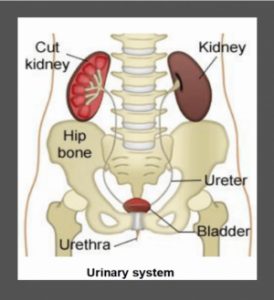or call 250.545.2922 | 250.542.2655
Urge Urinary Incontinence is the involuntary release of urine following a sudden strong urge to urinate.
Urine is composed of water, electrolytes, and other waste material that has been filtered out of the blood in your kidneys. Urine is then transported via the ureters to your bladder, where it is stored. Once full, the muscles in the wall of your bladder contract forcing urine through the urethra and out of your body.
Sphincter muscles and pelvic floor muscles keep the urethra closed to avoid leakage of urine. These muscles relax at the same time the bladder contracts in order to allow urine to exit your body.

There are several causes for Stress Urinary Incontinence, these include:
Alcoholic drinks and caffeine cause your bladder to fill more quickly and can trigger a strong uncontrollable urge to urinate.
Carbonated drinks, citrus juices, artificial sweeteners, tea, and coffee can irritate your bladder and worsen urge incontinence. Even teas and coffees without caffeine are irritants. Nicotine is also a bladder irritant.
When dehydrated, your urine becomes very concentrated. This highly concentrated urine can irritate your bladder and worsen urge incontinence.
During a urinary tract infection, bacteria can irritate your bladder. This can result in strong urges to urinate, increased frequency, and incontinence.
The bladder and rectum have a common nerve supply. Constipation causes compacted stool in the rectum which over-activates these nerves, increasing urinary urgency and frequency.
Overactive bladder is when nerves send signals to the bladder at the wrong time, causing it to contract at an inappropriate time leading to incontinence.
As you age, the capacity of your bladder to store urine decreases and the frequency of overactive bladder symptoms increases. The risk of an overactive bladder also increases with various blood vessel disorders, seen more commonly in the elderly.
This is a painful condition that involves inflammation and scarring of the bladder wall. Symptoms include painful, frequent urination as well as urinary incontinence.
The bladder and uterus are very close together and have common supporting ligaments and muscles. Surgery to, or removal of your uterus as in a hysterectomy, risks damage to the supporting structures of your bladder. If these supporting structures are damaged, a cystocele is likely to occur. Symptoms of a cystocele include urinary incontinence.
Symptoms of a cystocele include urinary incontinence. Additionally, surgery may damage the nerves that supply the bladder, also leading to urinary incontinence.
Symptoms of bladder cancer or bladder stones include urinary incontinence, urgency, frequency, and painful urination. Other symptoms include blood in the urine and pelvic pain.
Any neurological disorder such as multiple sclerosis, Parkinson’s disease or stroke can cause urinary incontinence by interfering with the nerve signals that control your bladder. Additionally, if the nerves that supply your bladder or pelvic floor muscles are damaged, urinary incontinence may also result.
Urge Urinary Incontinence can cause embarrassment, fear, anxiety, and social isolation. So it’s important to take steps to address the problem. Seeking treatment from a trained Pelvic Health Physiotherapist can help with the problem and also improve self-esteem and restore confidence.
Is your Bladder Ruining your Life?
Urinary incontinence is a common problem that affects both men and women. More.
Pelvic Floor + Women’s Health
Pelvic pain can be complex and have a multitude of causes or interacting structures that are contributing to the dysfunction such as scar tissue, tight fascia or a weak pelvic floor. More.
Subscribe To Our
Newsletter
The Spinal Column
Stay in the loop about events, workshops, and the latest news!
Easthill Physiotherapy + Acupuncture Clinic has protocols to ensure the utmost safety for our patients, team and community. We have worked hard to protect our public health during this pandemic. Medical masks are mandatory for all staff and patients to keep everyone safe, and we appreciate your commitment.
We continue to follow the guidelines and protective measures indicated by our regulatory boards and governments. Our team has also had extensive training on our new protocols, and we are all 100% committed to ensuring our patients’ safety.
This is the new normal.
All patients and staff will be screened before each visit. Unfortunately, anyone showing signs of respiratory infection will be unable to come into the clinic. We will encourage and book virtual physiotherapy appointments for those that need help but are symptomatic if a client is at greater risk or for anyone who is not comfortable coming into the clinic.
We have the highest standards for hand hygiene and cleaning. All equipment and rooms will be disinfected after each use, frequently touched surfaces will be sterilized, and personal protective equipment will be used in all appropriate situations. Patients and staff will have hand washing stations to ensure proper frequent hand hygiene.
We also understand that it is necessary to reduce the risk of transmission with physical distancing. To do this, we have installed plexiglass barriers, reduced the number of appointments available by spreading them out and designed an optimal patient flow that minimizes contact with other patients and staff before and after appointments. Our team is also committed to practicing these as measures of hand hygiene and physical distancing outside the clinic to be safe when they return to work.
Although it may seem different with the steps we need to take, the Easthill Physiotherapy + Acupuncture team is still the same! We still believe in the same values and are here to provide an extraordinary physiotherapy experience. This is not going to change. Our goal is to keep all of us healthy and happy.
Our fabulous admin team is available to book in-clinic appointments now. Or if you prefer a virtual physiotherapy visit, we can book that too. Please call us at 250-545-2922 to book an appointment or if you would like more information.
Chris Burk + Rob McMillan
Owners, Easthill Physiotherapy